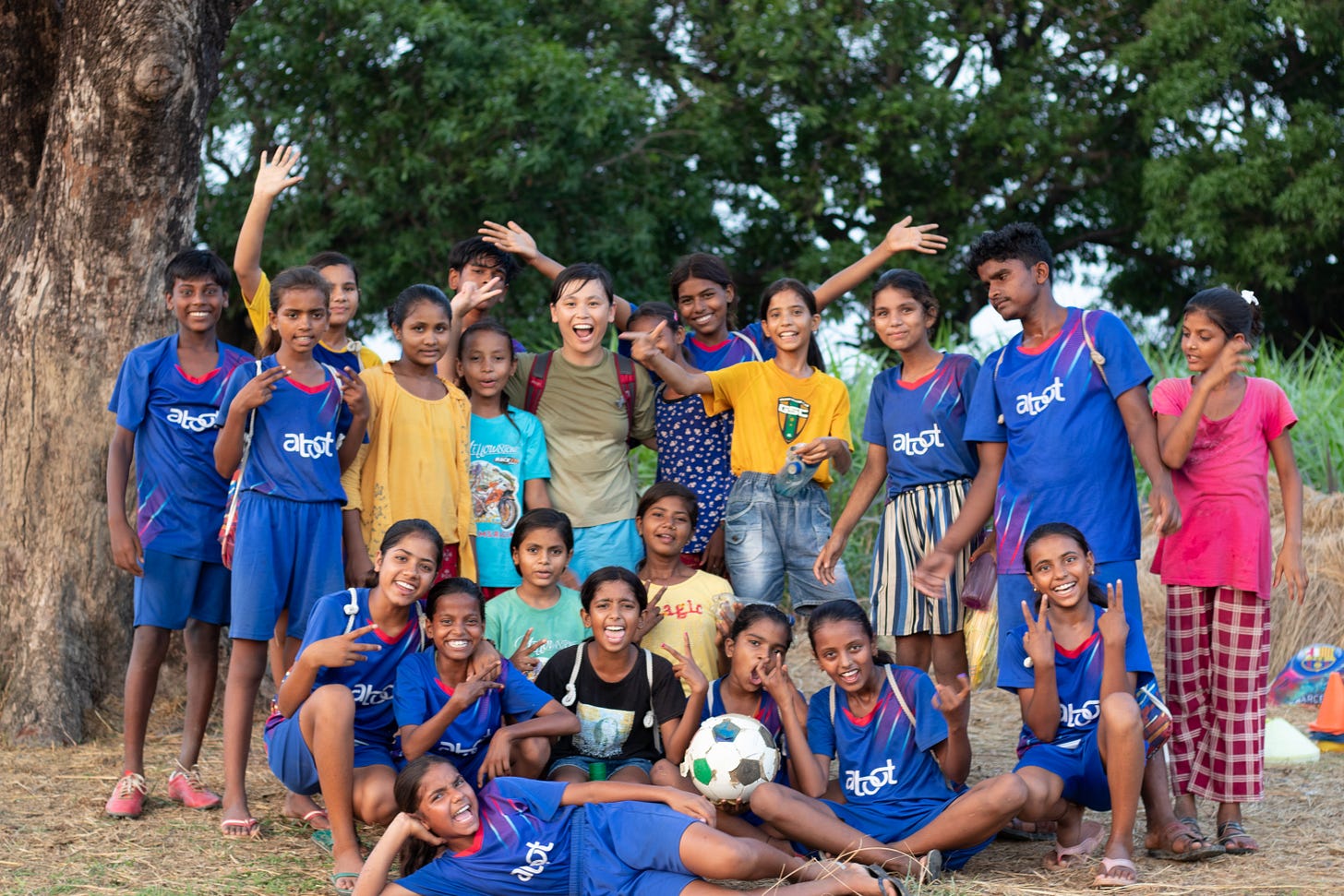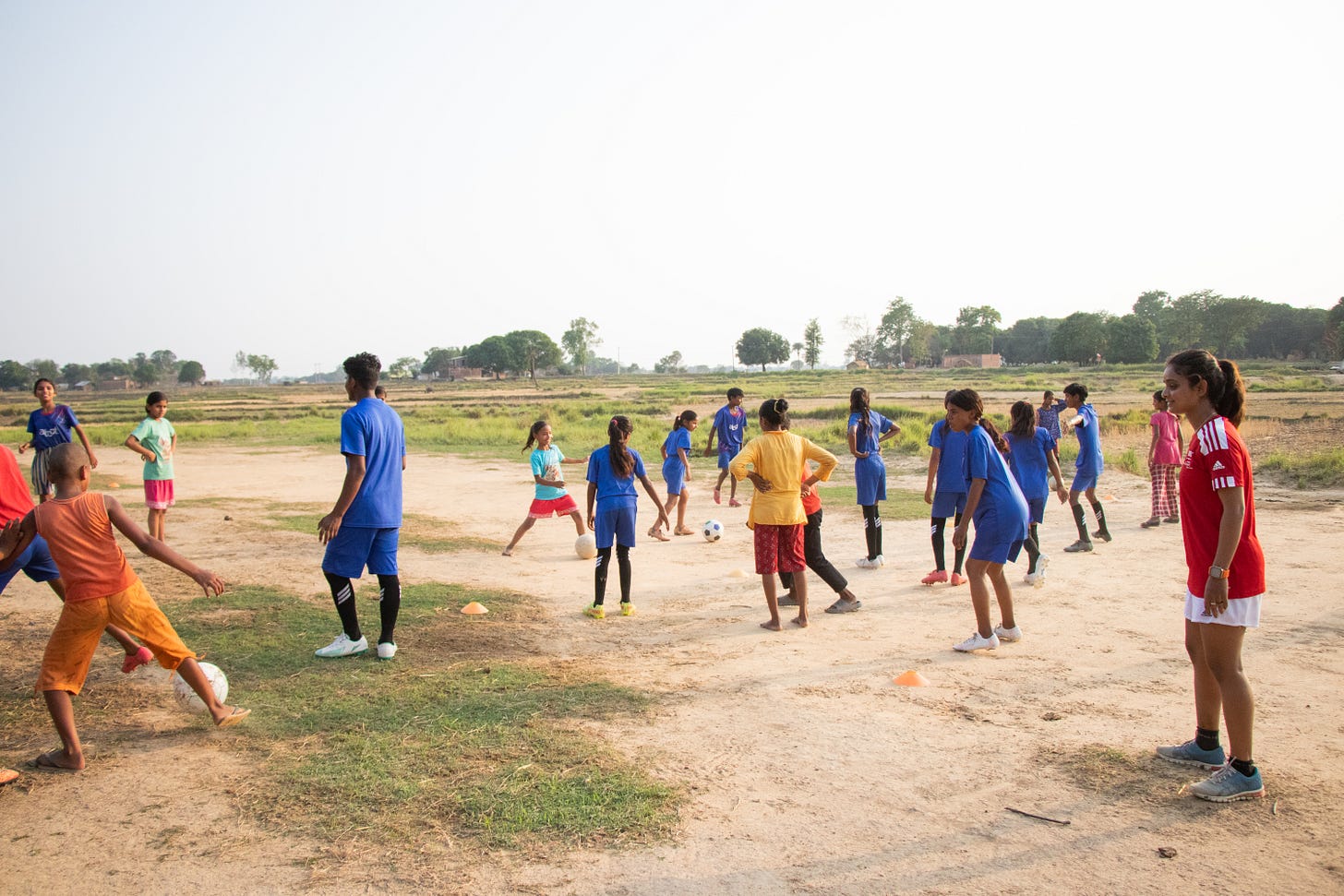Hello from China!
After a few days in Hong Kong, I’ve made it to the mainland without any issues at the border much to my relief.
I swear I will catch up on actual updates…but for now bear with me for another soccer-related post because I still haven’t filled you in on my time in Lumbini, Nepal. For a week (one of the hottest weeks of my life — it reached 109!) I got to spend time on the pitch with the folks at Atoot.
Five years ago on that same trip that took me to Bangalore, I went to Nepal where I connected with Mashreeb and Sharanya who were just starting the aforementioned nonprofit. They both worked for Yuwa, another nonprofit using soccer to empower young girls in India, with Sarah Van Vooren. Its participants have gone on to study at universities all around the world. Being from Nepal, Mashreeb wanted to bring the same sort of organization and opportunities to girls in his home country.
The last time we met, Mashreeb and Sharanya were newlyweds. Over a dinner in Kathmandu, they shared their vision for Atoot. They conducted surveys and extensive research to find where they would set up the nonprofit. For them, it was important that they were working with a population from a rural part of the country but also in a community that would be open to their programming. And one that was close enough to a city where the girls could go on to pursue higher education or get jobs if they wanted. A village in the Kapilvatsu district in Lumbini, Nepal was their final answer.
Now, five years later, they have a very cute, giggly little eight-month-old girl. And they are well-established in Lumbini. I’d been watching the organization’s growth from afar over Instagram and Facebook updates. I knew I wanted to see what they had created. They had given me an open invitation to visit after that first meeting but the pandemic and life got in the way. So it felt special to finally get to see it all for myself.
Lumbini is in the south of Nepal, where Atoot works is just a 20-minute or so scooter ride to the border. It sits in between the hills of both countries making it especially hot. The city — city perhaps is a generous term — is best known for being the birthplace of Buddha. Other than that, there isn’t much to do in the area.
After a 12-hour bus ride from Kathmandu, Mashreeb and I caught up over momos. He asked if I’d be up to come to the soccer session tomorrow morning at 4:30 a.m… And before I knew it I was on the back of his motorcycle headed out to the pitch. Mud houses, fields of wheat, and mango trees take over the landscape as we get closer to the village.
The field we arrive at is less a soccer pitch and more just a patch of land that hasn’t been claimed by the farmers and is fairly flat, but not very big. There are some kids already there wearing their blue Atoot jerseys and lacing up their boots. Monika is their main soccer coach. She also happened to be one of Mashreeb’s players when he worked at Yuwa. Now she is the program officer at Atoot.
I’ll add here that Rima, the intern who arrived the same day as I did, was also a beneficiary of Yuwa and like Monika knew Mashreeb, Sharanya, and Sarah from their time with the program. Rima is now a student at Washington and Lee University and wanted to intern with Atoot during her summer break since she had benefitted so much from such a similar program.
Monika and Rima shared their stories with me during the week I was there. They both come from villages where child brides are common, girls do not learn to read or write, and they definitely did not play sports. Now they look at how far they’ve come and shake their heads as they think about how much has changed for both them and other girls from their villages.
Rima coming to Atoot was a reunion for the two of them who hadn’t seen each other in years. They knew each other from their days at Yuwa when they were chosen to represent the organization at an international soccer competition in Spain.
The two giggled as they spent an afternoon reminiscing about that trip which was both of their first times out of the country. Rima described how none of the girls had any idea how to pack a suitcase, let alone a suitcase. Monika recalled how bland the food was at the tournament and how they would pretend to eat but would throw it away when their chaperones weren’t looking.
Then there was a story about how the girls broke the washer by putting all their cleats in it. And how Rima locked herself in the plane bathroom. How Monika and all the other girls stayed up all night singing and dancing in the hotel. Their amazement with shopping malls and nude beaches.
But the thing that stood out the most when they told me these memories were the two chaperones who led them on this trip. The patience and respect they had for the girls had left a mark on them. Now maybe they can be that for other little girls…

Back to my first day at the pitch.
I watched as Monika led the session and even joined in on a small-sided game. Later that week I ran two sessions for them. It was a new challenge for me as I considered the limited equipment we had (not enough balls for every player, no goals, no lines, a field that sloped…) and the language barrier.
Before arriving to Atoot wasn’t sure how involved I’d get. I was there to learn and observe. So it was a pleasure to share ideas and coaching bits with the staff. And much to my relief, the girls had a lot of fun too. The “I’m a star” punishment was a big hit with a couple of players. And a quick lesson on two-touch passing resulted in some really nice passing.
At the end of the week, the girls shared how much they enjoyed the sessions with me — I say this not to brag but because the reason they liked them was because they got to see just how far their English skills have come. Instead of immediate translation after I explained a drill the staff let the girls struggle a little bit and try and figure it out on their own. And while they did get a little help to answer questions they had, they found that they understood more than they thought and that was pretty cool to see.
Over the years the Atoot staff has worked hard to build connections with both the girls and their families. Monika, Alisha, and Swetha are Atoot’s staff and are in their early to mid-20s. They’ve created bonds with the girls that are impossible not to see when they pass through the village on the way to the classroom or pitch. The girls scream out “Good evening, Didi!” and run to hug them or tell them a bit of news from their day. The staff are as equally excited to see the girls as they receive the girls’ arms wide open.
I can’t say enough about Monika, Alisha, and Swetha. They live in a house together that doubles as their office and commute to the pitch and classroom every weekday. When they’re not with the girls they’re planning lessons or soccer sessions, applying for grants, doing social media, or pursuing other opportunities for Atoot or themselves. Sure, anyone can do this sort of work. But the fact that two of them are from not too far away and the other is a beneficiary of a similar program to Atoot, speaks volumes — that girls who look like them and come from similar backgrounds can in fact get a higher education and have jobs.

The three of them made me and Rima feel so welcome as we were introduced to Atoot and the community. For the week I was there, we enjoyed lunches and dinners together, hot afternoons in the office, and snack breaks that consisted of momos and samosas. Monika even convinced me to stay an extra day. I was set to leave on Saturday but she wanted to me to play some soccer with the group she usually plays with. How could I say no to that?
When our goodbyes did eventually come it felt bittersweet. I promised I’d be back. I even pinky-promised some of the girls…so you know it has to happen now!
If you are interested in learning more about Atoot you can read more here and donate here.
Thanks for reading,
DD





